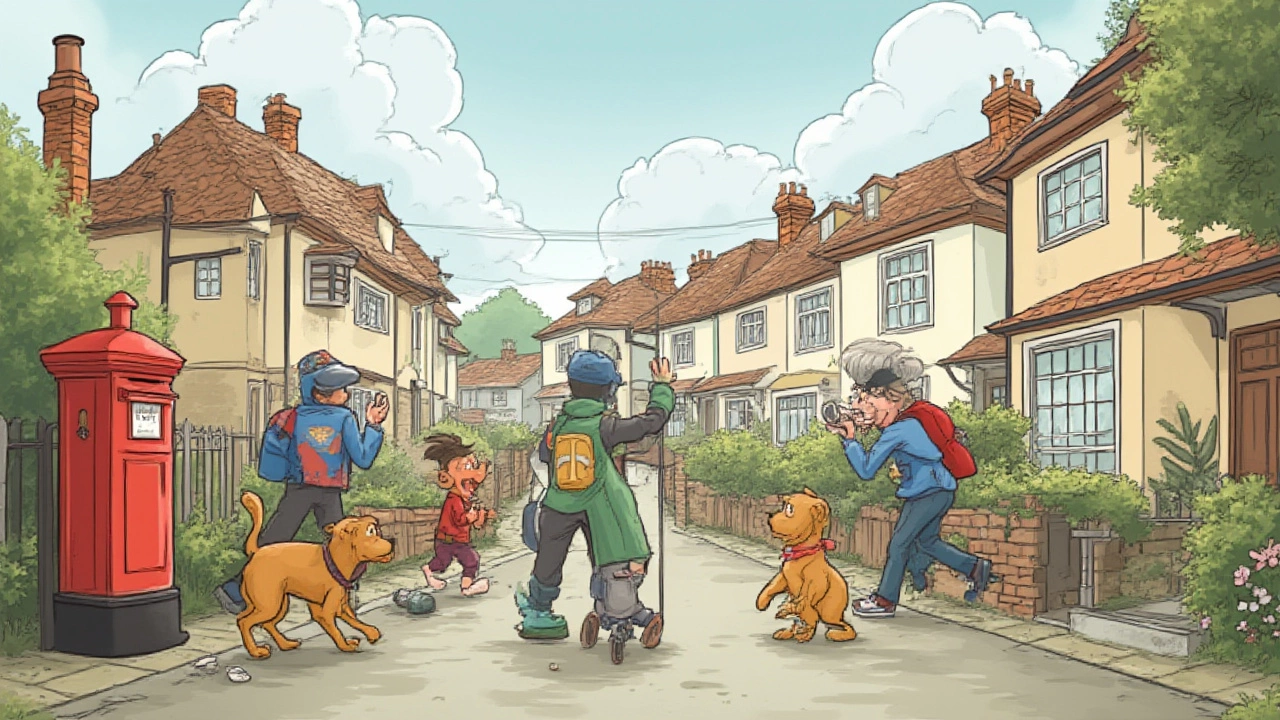Picture this: you’re finally home after a long day, and your dog launches into a barking marathon the second a squirrel sneezes three blocks away. Maybe you’ve tried shushing, bribing with treats, or pleading with the universe. Sound familiar? Barking can drive anyone a little nuts, but what actually makes it stop—not just for a minute, but for good?
Why Do Dogs Bark—and Why Won’t They Stop?
If stopping barking was as easy as asking your dog nicely, dog trainers would be out of a job. Dogs bark for tons of different reasons, and here’s the catch—each cause needs its own fix. Some pups bark because they’re bored out of their minds. Others do it when they’re scared, anxious, excited, or just trying to say, 'Hey, that Amazon delivery guy is here again.' If you try a one-size-fits-all approach, it’s like shouting at your phone when you have no signal. Nothing happens.
Barking is also in their DNA. If you look at a study from the University of Lincoln (2021), dogs’ barking evolved as a communication tool. Wild dogs don’t bark as much, but domestic dogs have learned it gets attention from humans. If your dog thinks barking at people through the window makes you look their way or even yell at them, they’re getting what they want. Weird reward system, right?
Then there’s breed. Some dogs like beagles and terriers were pretty much invented to bark—they alert, they chase, they howl, repeat. You can see where this is going. It’s not just 'bad behavior,' it’s what they’re wired to do. Controlling that means figuring out the why before diving into the how. For example, if your Chihuahua barks every time she’s left alone, it’s not stubbornness—it might be separation anxiety. Fun fact: According to a survey by the American Veterinary Medical Association in 2023, more than 44% of dog owners say their dogs bark more when left on their own. Another group? The excitement barkers—those who get so jazzed about literally anything, their answer is always volume.
So, barking isn’t just background noise—it’s your dog’s way of telling you something. Figuring out the message is the first real step toward less barking and more peace and quiet.

The Real Science (and Myths) About Stopping a Dog from Barking
Let’s bust a myth: No magic gadget or method will silence barking forever, not even those fancy collars you’ve seen on late-night TV. In fact, a 2022 Pacific University study found citronella or static bark collars made some dogs more anxious, not less noisy. So what actually works, and what’s just wishful thinking?
First, meet 'positive reinforcement.' It’s proven, science-backed, and doesn’t hurt anyone’s feelings. When your dog stays quiet, reward them. Yeah, it sounds too simple, but it’s how thousands of guide dog trainers and professional handlers do it every day. If they can train Labradors to ignore squirrels during guide work, you can teach your corgi to stay chill when the neighbor mows his lawn. Use treats, but also use praise, petting, or a favorite toy. Consistency is the secret sauce here. If you only reward them 'sometimes,' your dog might roll the dice on barking because it pays off half the time.
What about shouting 'quiet!'? This usually backfires. To your dog, you might as well be barking right along with them. They hear excitement, not a command. Want proof? When the ASPCA ran trials back in 2021 with families using various commands, simply yelling at the dog ended up increasing volume in more than 60% of households. Oops.
Negative tools—like shock collars or even those little cans of compressed air—might make things worse, especially for anxious dogs. Behavioral experts at the RSPCA point out these aversive methods risk hurting trust between you and your dog, and can spark even bigger behavior issues down the line. Not the vibe anyone wants at home.
So, what’s the right mix? Combine positive reinforcement with smart management. If your dog barks at people walking by your window, cover the lower half with frosted film—or rearrange the room. Sometimes the solution is that easy. Data from the Humane Society in 2024 showed that blocking visual triggers cut barking by half for over 80% of dog owners in their study. If boredom is the trigger, enrichment is the fix. Puzzles, sniff walks, training games—even a Kong stuffed with peanut butter buys you peace during conference calls.
Sometimes, the simplest answer is the best. A tired dog is a quiet dog. Regular exercise doesn’t just drain physical energy, it tackles the mental restlessness that leads to 'boredom barking.' Try balancing physical play with activities that make your dog think—like hide and seek or nose-work games. Think less treadmill, more treasure hunt. There’s a reason trainers always say, 'Let their nose do the work.'
| Method | Effectiveness | Best For | Warnings |
|---|---|---|---|
| Positive Reinforcement | High | All barking types | Requires patience |
| Shock Collars | Low/Variable | Excessive barking (last resort) | Can cause anxiety & trust problems |
| Visual Blocking | High | Alert barking (windows/doors) | Doesn’t fix root cause |
| Enrichment Toys | Moderate-High | Boredom barking | Pick safe, tough toys |
| Increased Exercise | High | High energy or young dogs | Needs daily commitment |
Now, let’s talk about professional help. There’s no shame in calling a certified dog trainer or veterinary behaviorist. If barking is tied to serious anxiety, aggression, or compulsion, it’s not just annoying; it’s a mental health issue for your dog. Trainers use tailored techniques—desensitization, counterconditioning, or even medication for extreme cases. If you’ve tried everything and your pup still throws a barking fit when the wind blows, chances are there’s an underlying problem that needs a pro. About 18% of dog owners in a recent European survey said working with a behaviorist made a huge difference in just a few weeks.

Real-Life Tips: Putting the Science to Work With Your Own Dog
Now for the fun part: transforming all this info into actual peace and quiet at your place. Here’s how to use what scientists and trainers know, in a way that works in the real world—like, with your actual dog, not some theoretical perfect pooch.
If your dog is a doorbell barker, try this: the next time someone rings the bell, toss a handful of tiny treats on their bed or a designated 'quiet spot.' Don’t shush; just redirect. With a few repeats, your dog will start running to the bed instead of going ballistic at the door. Karen Overall, a well-known veterinary behaviorist, calls this 'building a new routine.'
For dogs glued to the window, try sticky window film—it’s cheap, easy, and stops that neighborhood jogger from triggering the canine alarm. Keep in mind, though, this is just managing the environment, not fixing the habit forever. Pair it with teaching your dog a 'quiet' cue, so you have something to fall back on when things get wild. Here’s how:
- Wait for a calm moment, and say 'quiet.'
- As soon as your dog is silent, reward with praise or a treat.
- Repeat, gradually making it more challenging (add distractions, stretch the time before the reward).
- Never say 'quiet' while your dog is still losing it—it just muddies the signal.
If boredom barking is the real villain, get creative. Rotating toys (only leave out a handful at a time) keeps interest fresh. Stuff rubber toys with kibble or cheese. Change your walk routes. Try puppy 'playdates' or agility exercises—even in your backyard. A study in Applied Animal Behaviour Science (2024) found that dogs given new challenges three times a week barked 38% less at home. Not bad, right?
The one thing to never do: use punishment or scare tactics. Besides not working long-term, they mess with the bond you want with your pup. If you want a dog who listens, trusts, and doesn’t bark their head off at 3am—make the training a team effort, not a battle. On tough days, remember, even the pros have setbacks. You’re working against biology, habit, and sometimes a little stubborn streak, but consistency pays off. Take a breath, grab some high-value treats (roast chicken tops my list), and try again tomorrow.
If you’re struggling with a super stubborn case, reach out to your vet first—they can rule out medical reasons like hearing loss or cognitive issues (especially in older dogs). Don’t forget: a lot of barking is just communication. If you stop and listen—really listen—it gets easier to help your dog speak more quietly.
Nothing fancy, nothing cruel, just science, patience, and a little creative problem solving. The secret isn’t silencing your dog, but helping them relax so they don’t feel the need to shout. You, your neighbors, and your dog will finally get a break—or at least, a little more sanity in the daily dog chorus.
